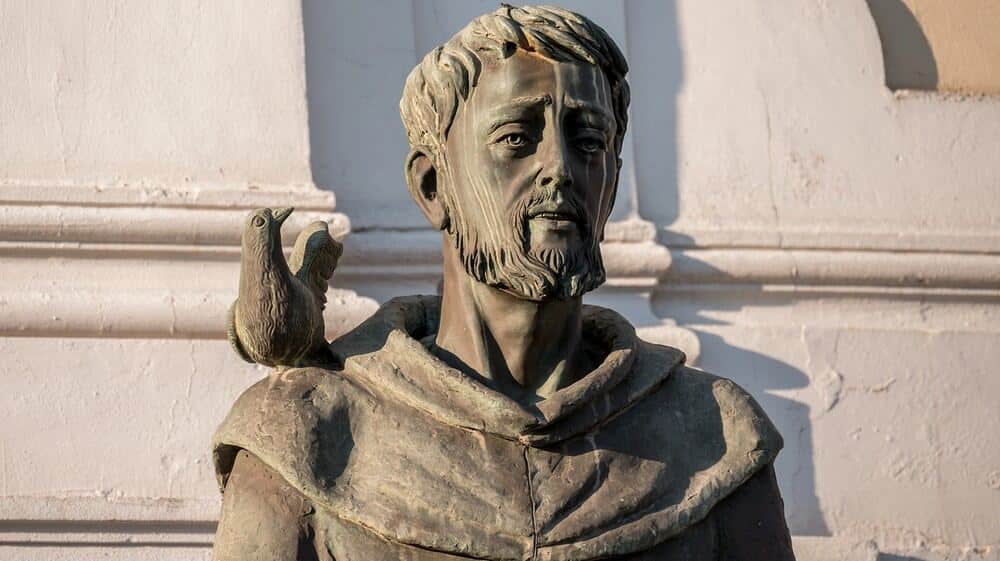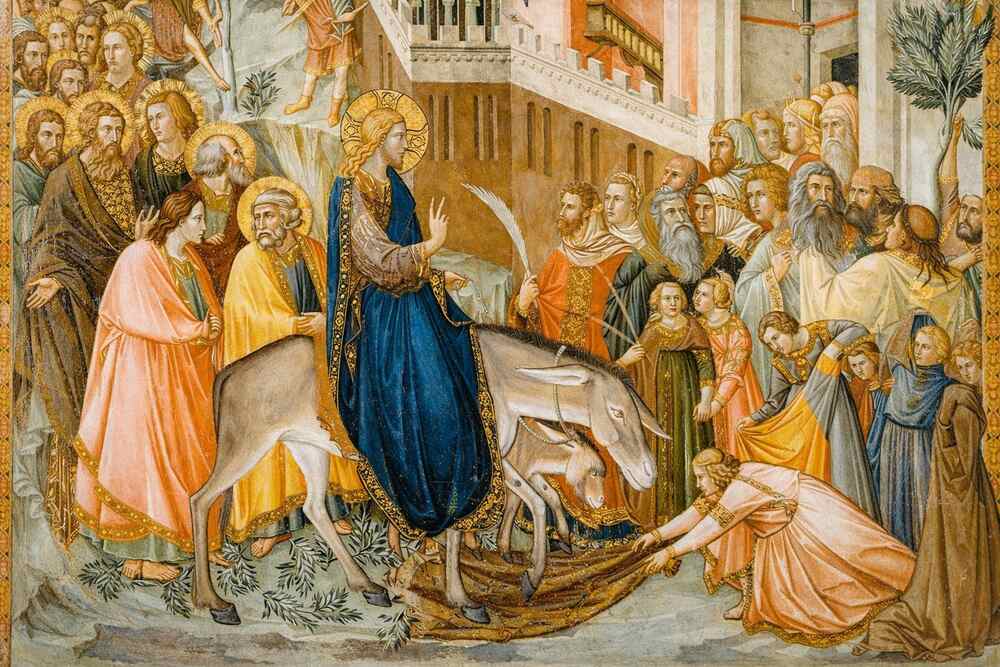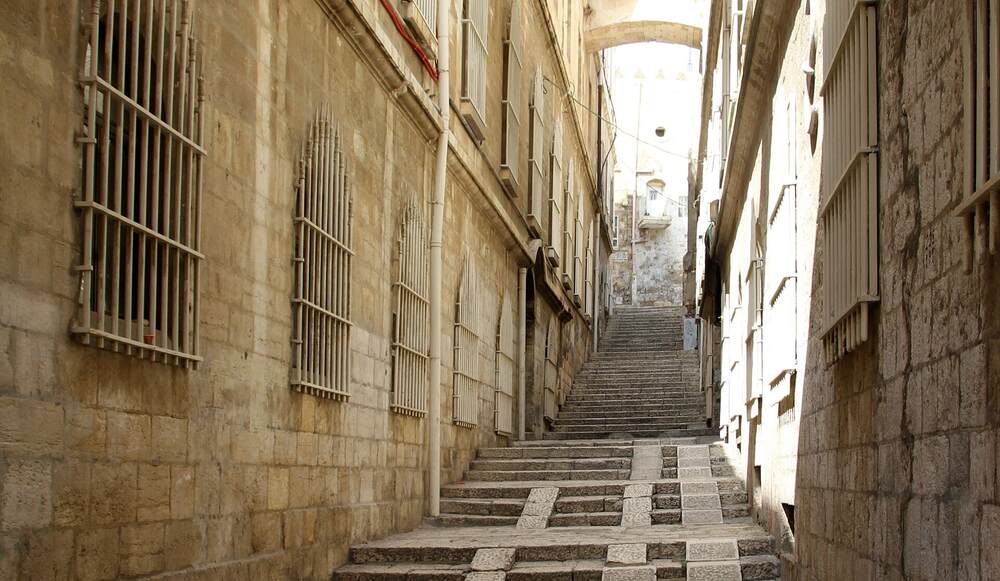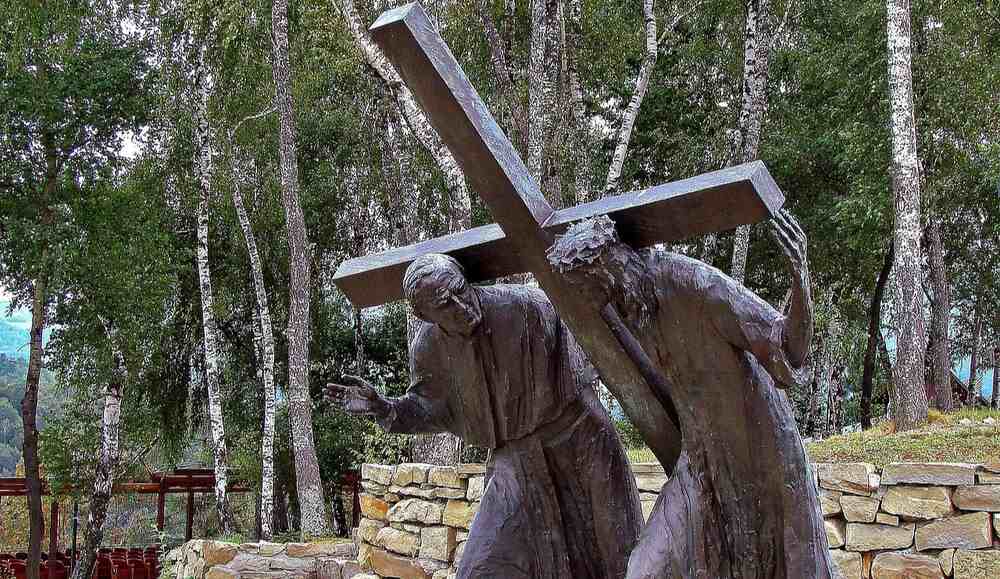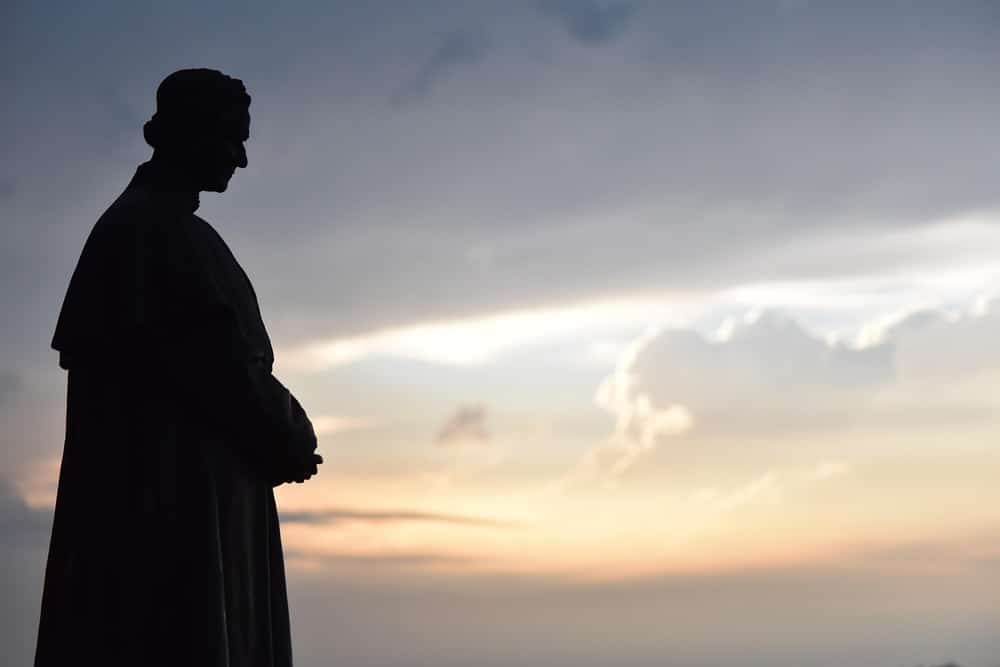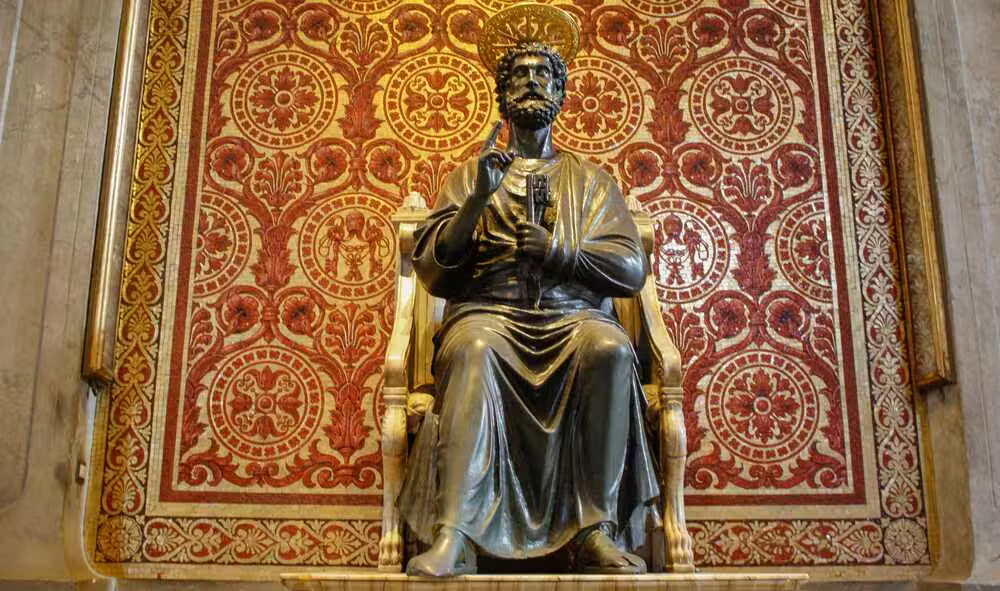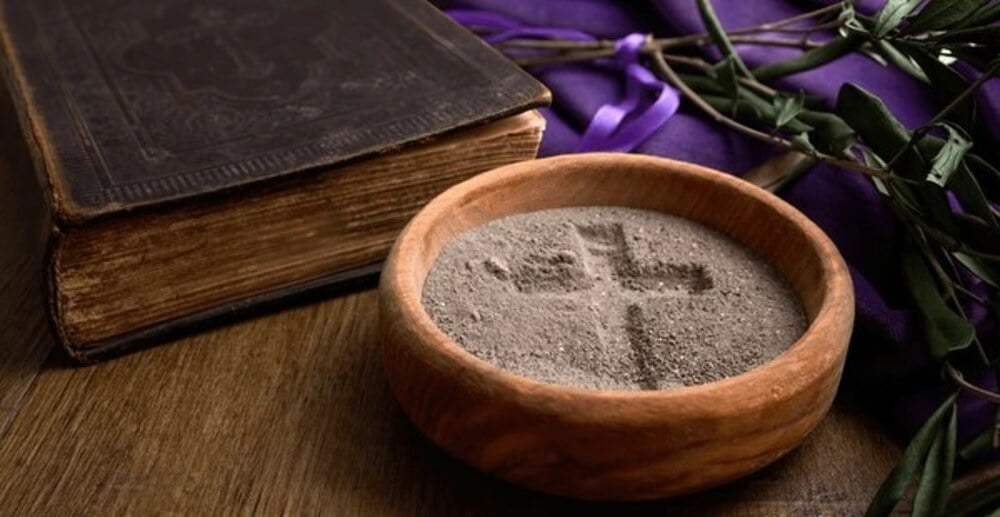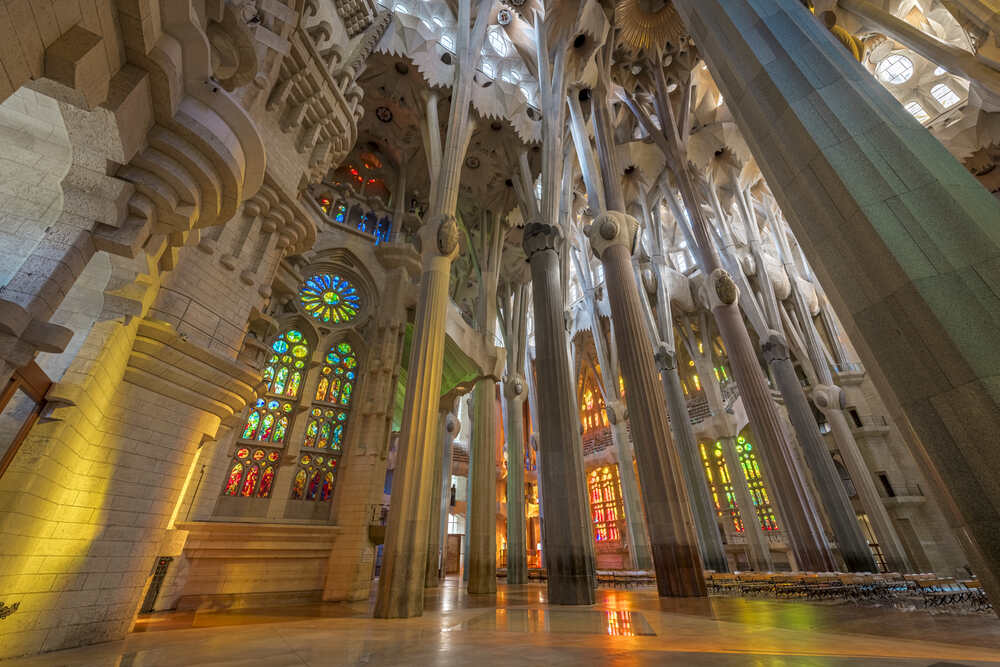Did you know that the Church teaches that St Francis of Assisi is the saint whose life most resembled that of Christ? His simple life—marked by detachment, joy, and love for all creatures as reflections of God—continues to inspire the whole world.
In this article, you’ll discover his biography, his most beautiful reflections on the Eucharist, and the prayers that millions of believers recite each day—some written by him, others asking for his intercession.
Come and discover the wonders God worked through this humble “Poverello of Assisi.”
Biography of St Francis of Assisi
Youth: The Troubadour of Assisi (1182–1205)
Francis was born in the Italian town of Assisi, in Umbria, on September 26, 1182. His baptismal name was John, but his father, Pietro Bernardone—a wealthy cloth merchant fascinated by French culture—lovingly called him
From a young age, Francis stood out for his joyful spirit and his love for music and poetry. Popular among the youth of Assisi, he lived freely, spending lavishly on fine clothes and festivities, inspired by the songs of the French troubadours. His mother once said of him:
“He seems more like a prince than our son.”
Although he worked in his father’s business, Francis was unusually sensitive toward the poor. Once, after ignoring a beggar in the marketplace, he felt deep remorse, ran after him, and gave him alms—vowing never to refuse anyone in need again.
In his youth, Francis dreamed of military glory. In 1202 he joined the war between Assisi and Perugia, where he was captured and spent a year in prison. His cheerfulness never wavered, even in captivity. After being released, an illness forced him into a time of reflection. Later, when he attempted to join a military expedition in Apulia, he had a dream in which a voice told him:
“You have misunderstood the vision. Go back to your town.”
He returned to Assisi humiliated and confused—but inwardly changed.
You can use the Catholic Mass Times app to find the nearest Catholic church with Mass, Confession, and Adoration schedules. It will surely help you! Download it now.
Conversion: The Jester of God (1206–1209)
Francis’s radical transformation began in 1206. One day, as he rode through the countryside, he encountered a leper. Overcoming his natural disgust, he dismounted, embraced the man, and gave him alms. That moment marked his heart forever.
Soon after, while praying in the dilapidated chapel of San Damiano, Francis heard Christ speak from the crucifix:
“Francis, do you not see that my house is in ruins? Go and rebuild it for my sake.”
Taking the words literally, Francis began repairing churches. He sold his horse and some of his father’s cloth to fund the work—provoking Pietro Bernardone’s fury. Their conflict came to a climax when Francis publicly renounced his inheritance and, standing before the bishop of Assisi, removed his clothes, declaring:
“Until now I have called Pietro Bernardone my father; but from this day on, I say only: ‘Our Father who art in Heaven.’”
From then on, he lived as a beggar. Wearing a simple tunic, he asked for stones to rebuild churches and sang joyful praises to God in French—the language of his youth. Thus was born “the Jester of God.”
The Foundation of the Three Franciscan Orders (1209–1221)
On February 24, 1208, after hearing the Gospel proclaimed, Francis understood his calling: to live in absolute poverty following Christ. Soon others joined him—Bernard of Quintavalle, Peter Cattani, and more—and in 1209, he traveled to Rome with eleven companions to seek approval from Pope Innocent III.
Though some cardinals distrusted his radical simplicity, the Pope was moved by a dream in which he saw Francis supporting the Basilica of St. John Lateran. He verbally approved Francis’s way of life, and thus the Order of Friars Minor was born.
In 1211, inspired by Francis, Clare of Assisi founded the Second Order, known as the Poor Clares.
A decade later, in 1221, Francis created the Third Order, for laypeople who wanted to live the Gospel spirit while remaining in their homes and professions. Kings, poets, and farmers alike joined this movement —among them, Saint Louis of France and Dante Alighieri.
- You may also like: Biography of Saint Francis of Assisi by G.K. Chesterton
Mission, Trials, and Final Years (1211–1226)
Francis’s missionary zeal led him to the East. He wished to end the Crusades by preaching peace and conversion to Muslims. In his own words, he wanted to:
“Proclaim the faith of Christ to the Saracens for the salvation of their souls.”
In the Franciscan Rule, the saint wrote that his followers should:
“Proclaim the word of God, so that [the unbelievers] may believe in Almighty God, Father, Son, and Holy Spirit, creator of all things, and in His Son, Redeemer and Savior, so that they may be baptized and become Christians, for whoever is not born again of water and the Holy Spirit cannot enter the Kingdom of God.”
In 1219, during the siege of Damietta, Egypt, Francis courageously visited the Sultan al-Kamil. The ruler, impressed by his humility, allowed him to depart unharmed.
When you invade the lands you have usurped, the Christians act justly, for you blaspheme the Name of Christ and strive to lead as many people as possible away from the true Religion. If, on the other hand, you wished to know, confess, and worship the Creator and Redeemer of the world, the Christians would love you as they love themselves.
Thanks to that meeting, the Franciscans were later granted guardianship of the Holy Places in Jerusalem.
When Francis returned to Italy, he found tensions within his rapidly growing order. Saddened by the drift away from his vision of radical poverty, he withdrew to Mount La Verna. There, in 1224, he received the stigmata of Christ, becoming the first saint to bear the wounds of the Crucified.
The stigmata marked the end of his active life.. As his health declined, he composed the Canticle of the Creatures—one of the earliest poems in Italian—praising God through the beauty of creation.
On October 3, 1226, in the small chapel of the Porziuncola, Francis asked to die naked upon the earth as a final act of humility. He was 44 years old. Only two years later, Pope Gregory IX canonized him in Assisi, recognizing in him “the man most like Christ.”
Quotes from St Francis on the Eucharist
Saint Francis had an immense reverence for the Blessed Sacrament. Out of deep humility, he chose never to become a priest, remaining a deacon all his life—believing himself unworthy to consecrate the Body and Blood of Christ.
His biographers tell us that he frequently received Communion with such devotion that he inspired the same in others. Holding in deep reverence all that is worthy of utmost reverence he offered the sacrifice of all his members, and, upon receiving the slain Lamb, he also offered his soul in the fire that continuously burned on the altar of his heart.
Here you can see quotes from Saint Francis drawn from some of his writings, such as letters and rules. Contemplate his love for the Holy Sacrament:
Let all mankind tremble, let the whole world shudder, and let heaven rejoice, when on the altar, in the hands of the priest, stands Christ, the Son of the living God! Oh admirable exaltation and astonishing condescension! Oh sublime humility!
Oh humble sublimity, for the Lord of the universe, God and Son of God, humbles Himself in such a way that for our salvation He hides beneath a tiny form of bread! —Letter to a Minister, 26-27.
I also beg in the Lord all my priest brothers, those who are now, those who will be, and those who desire to become priests of the Most High, that whenever they wish to celebrate Mass, they may offer, purified, with purity and reverence, the true sacrifice of the most holy Body and Blood of our Lord Jesus Christ, with a holy and clean intention,
and not for any earthly reason, nor out of fear or love of any man, nor to please anyone
(Letter to All the Clergy, 14).
And just as they [the Apostles], with their bodily eyes, saw only His flesh, but with the eyes of the Spirit believed that He was God, so too let us, when we see with our bodily eyes the bread and the wine, see and firmly believe that it is His most holy Body and Blood, living and true.
And in this way the Lord is always with His faithful, as He Himself says: “Behold, I am with you always, even to the end of the age.”
Behold, He humbles Himself daily, as when He descended from the royal throne into the womb of the Virgin; daily He comes to us in humble form; daily He descends from the bosom of the Father to the altar in the hands of the priest.
And just as He appeared to His holy apostles in true flesh, so also now He shows Himself to us in the consecrated bread. And just as they, with their bodily sight, saw only His flesh, but with spiritual eyes believed that He was God, so too let us, when we see with our bodily eyes the bread and the wine, see and firmly believe that it is His most holy Body and Blood, living and true.
The will of His Father was that His blessed and glorious Son, whom He gave to us and who was born for our sake, should offer Himself as a sacrifice and victim, by His own Blood, on the altar of the Cross—not for Himself, by whom all things were made, but for our sins—leaving us an example that we might follow in His footsteps.
And He wills that all of us be saved through Him, and that we receive Him with a pure heart and a chaste body.
- You may be interested in:
100 Saint Quotes about the Catholic Mass
Prayers of Saint Francis of Assisi
Prayer Before the Crucifix of San Damiano
Most High,glorious God,enlighten the darkness of my heartand give metrue faith,certain hope,and perfect charity,sense and knowledge,Lord,that I may carry outYour holy and true command.
The Canticle of the Creatures by St. Francis
Most High, all-powerful, good Lord,Yours are the praises, the glory, and the honor, and all blessing,
To You alone, Most High, do they belong,and no human is worthy to mention Your name.
Praised be You, my Lord, with all Your creatures,especially Sir Brother Sun,Who is the day and through whom You give us light.
And he is beautiful and radiant with great splendor;and bears a likeness of You, Most High One.
Praised be You, my Lord, through Sister Moon and the stars,in heaven You formed them clear and precious and beautiful.
Praised be You, my Lord, through Brother Wind,and through the air, cloudy and serene, and every kind of weather,through whom You give sustenance to Your creatures.
Praised be You, my Lord, through Sister Water,who is very useful and humble and precious and chaste.Praised be You, my Lord, through Brother Fire,through whom You light the night,and he is beautiful and playful and robust and strong.
Praised be You, my Lord, through our Sister Mother Earth,who sustains and governs us,and who produces various fruit with colored flowers and herbs.
Praised be You, my Lord,
through those who give pardon for Your love,and bear infirmity and tribulation.
Blessed are those who endure in peace for by You,Most High, shall they be crowned.
Praised be You, my Lord, through our Sister Bodily Death,from whom no one living can escape.Woe to those who die in mortal sin.
Blessed are those whom death will find in Your most holy will,for the second death shall do them no harm.
Praise and bless my Lord and give Him thanksand serve Him with great humility.
Prayer in Honor of the Sacred Stigmata of Saint Francis of Assisi
Most glorious Protector and my Father, Saint Francis, I come to you imploring your powerful intercession, that I may understand the love our Lord God showed you when He allowed your flesh and spirit to be marked with suffering. Your wounds are five flames of divine charity, five tongues that remind me of the mercies of Jesus Christ, five heavenly fountains of grace that the Creator entrusted to you to distribute among your devotees.
O most lovable Saint! Ask the crucified Jesus to grant me a spark of the fire that burned in your soul on that blessed day when you received the seraphic crucifixion, so that, remembering your supernatural privileges, I may imitate your example and follow your teachings, living and dying in the love of God above all things.
Pray five Our Fathers, Hail Marys, and Glory Bes in honor of the Five Wounds of Saint Francis.
My Seraphic Father, Saint Francis, poor and unknown to all, and therefore exalted and favored by God. Because I see you so rich in divine treasures, I come to ask you for alms. Grant them to me generously, for the love of the good Jesus and our Mother, the Immaculate Virgin Mary, and for the vow you made to give, out of love for them, all that was asked of you. For the love of God, I beg you to obtain for me sorrow for my sins, humility, and love for your Passion; conformity with the will of God, prosperity for the Church and for the Pope, the exaltation of the faith, the defeat of heresy and unbelievers, the conversion of sinners, the perseverance of the just, and the eternal rest of the souls in Purgatory. I ask this of you for the love of God.
So be it.
Imitating Saint Francis of Assisi
Saint Francis remains one of the most beloved saints in the Church. Let us ask him to teach us the joy of simplicity, the freedom that comes from detachment, and a merciful heart toward those who suffer. Above all, may he help us love the Blessed Sacrament as he did—so that, like him, Christ may become the very center of our lives.
And if you don’t know where there is Mass or Adoration near you, remember that you can use the Mass Times app to find the nearest Catholic church with schedules for Mass, Confession, and Adoration in your city or anywhere in the world. St. Francis would be happy to help you get closer to Jesus! It will surely help you! Download it now.
Who was Saint Francis of Assisi?
Saint Francis of Assisi (1182–1226) was an Italian saint and the founder of the Franciscan Order. Known as the “Poverello of Assisi,” he lived a life of poverty, humility, and love for all creatures. The Church recognizes him as the saint whose life most resembled that of Christ.
How did Saint Francis of Assisi die?
Saint Francis of Assisi died on October 3, 1226, at the age of 44, in the Porziuncola, Assisi. He passed away ill, nearly blind, and bearing the stigmata of Christ. His death was peaceful—he lay upon the ground as a sign of complete detachment from worldly things.
cluso en lo más sencillo.
When is Saint Francis of Assisi’s feast day?
The Church celebrates Saint Francis of Assisi on October 4 each year. It is one of the most important feasts in the Catholic calendar, and in many places, animals are blessed in honor of the patron saint of nature and ecology.
What does Saint Francis of Assisi protect?
Saint Francis of Assisi is the patron saint of animals, ecologists, merchants, and Italy. His spirituality invites us to care for creation as a reflection of the Creator’s goodness toward us.
What do people ask of Saint Francis of Assisi?
People ask Saint Francis of Assisi for help to live with humility, peace, and joy. Many pray to him for the protection of animals, strength in poverty, serenity in trials, and a simple heart to love God and others.

